When you want to move, you have to choose how hard it’s gonna be. Do you want to risk a complete DIY job, or pay extra for the pros? Between doing it all yourself and hiring professional movers, there’s a few other options you may want to consider. That’s why we made this guide.
At Moving APT, we specialize in connecting our customers with the best moving services for their needs. We’ve spent over 20 years in the moving game, and it’s taught us what works, what doesn’t, and what you should look out for when you start planning a move. Now, we’re ready to share what we know. Read on, and choose the moving option that’s best for you.
Your Moving Options at a Glance
In our experience, there’s typically four main approaches to moving:
- DIY Moving: This is what most people think of when they start planning a move. DIY moving means you’re on the hook for every step of the process, from renting a truck to driving it across country. You’ll also have to do your own packing and planning.
- Full Service Movers: The opposite side of the spectrum from a DIY job. Full service movers will handle all the hard stuff, including packing, transportation, loading, and unloading. It comes at a price, but the convenience is worth the cost.
- Moving Containers: Call ‘em PODS, call ‘em containers, call ‘em whatever you want – they’re big, portable storage units that you fill up with your stuff. Pack on your own time, and when the time’s right, the container company transports it for you.
- Moving Labor: One step removed from a complete DIY job. When you book moving labor, you’ll get a team of professional movers to handle just the heavy lifting. And maybe the packing, if you request it. The rest of the job is still up to you.
Prefer not to leave your phone number?
No problem!
Schedule an Appointment at your Convenience
(Only email is required)
Schedule an AppointmentOr Call Now
800-360-0037Wait!
You're only a few steps away from finding the perfect movers for your needs
Prefer to Schedule an Appointment
No problem! Schedule an appointment at your convenience by clicking the link below. We'll be ready to assist you whenever works best for you. Thank you!"
Setup an appointmentOption 1: DIY Moving
You can DIY a move for as little as $200 or so, but is it really worth the trouble?
If you’ve ever moved before, you’ve probably dealt with DIY moving already. And if this is your first time planning a move, well, take it from us – it’s not always the best option.
While it’s true that DIY moving is the cheapest option out there, it takes a lot of discipline to make sure you’re coming out ahead financially.

You’ll have to rent a truck, pay for gas, and (if you’re moving long distance) pay for food and lodging while you’re at it. And if you’re taking time off from work, and missing a few paychecks, those DIY savings may not be worth the effort.
This isn’t to say DIY moves don’t have a place. They’re a great option if you’re just moving a small amount of stuff. And while they’re tough to execute, they’re pretty easy to plan. After all, it’s just you managing the whole process.
Pros
- Cheap (if you do it right)
- Great option for tiny amounts of stuff
- Pretty streamlined
- Easy to plan
- You’re fully responsible for every step
Cons
- Expensive (if you do it wrong)
- Stressful
- Time-consuming
- You’ll still need help
- Full responsibility means full responsibility
Option 2: Full Service Movers
Full service moving companies range from as low as $400 to as much as $12,000 (and sometimes more). Fortunately, there’s plenty you can do to keep your price low.
Hiring full service movers is pretty much the exact opposite of DIYing it. They’re a complete VIP experience: Once they go to work, you won’t have to lift a single box, or wrap a single plate. The biggest downside is the price, since this level of service doesn’t always come cheap. But you can shop smart (and use a service like Moving APT) to lock in a good deal.
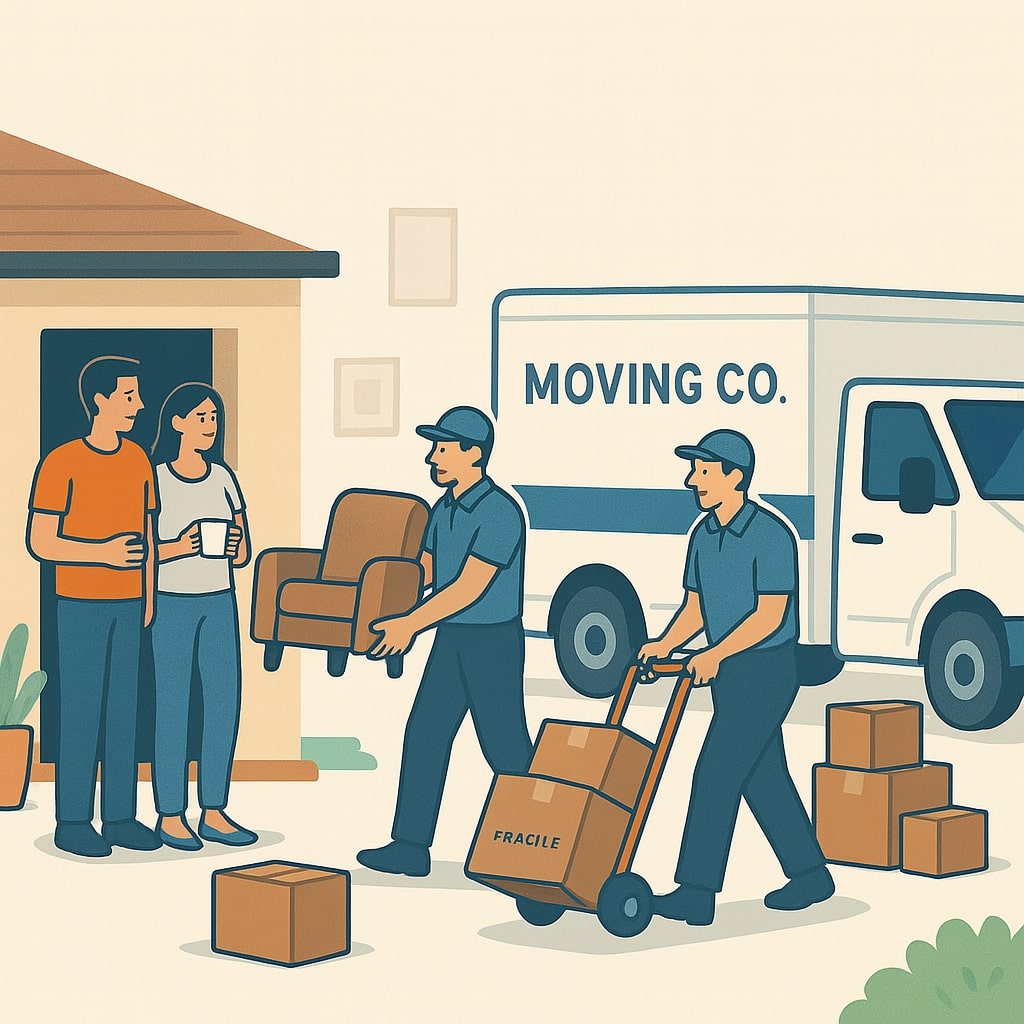
We’ve seen full service moves for as little as $400. And we’ve seen some that were way up there – $12,000 for a big, cross-country job and a five-bedroom home.
Every move is different, so pricing varies. Generally, the more items you have, the more you have to pay – so make sure you downsize as much as possible before shopping for quotes.
Pros
- Completely hands-off on your end
- No need for multiple trips
- You can focus on other to-do list items
- Planning, prep, and coordination is all done by pros
- Packing by pros too
Cons
- Service comes at a cost
- A lot of scammers out there
- May be difficult to secure an exact time slot
Option 3: Moving Containers
Moving containers will cost you between $299 and $499 for a local job, and $1,000 to $3,000 for long distance relocations. Plus, you get a lot more flexibility.
Different companies have different names for these things. Most notable is PODS, but U-Haul markets them as “U-Box containers”. The names change, but the basic operation is always the same: A container company drops off a moving container, you pack it up at your own pace, and then the company picks it up and hauls it for you.
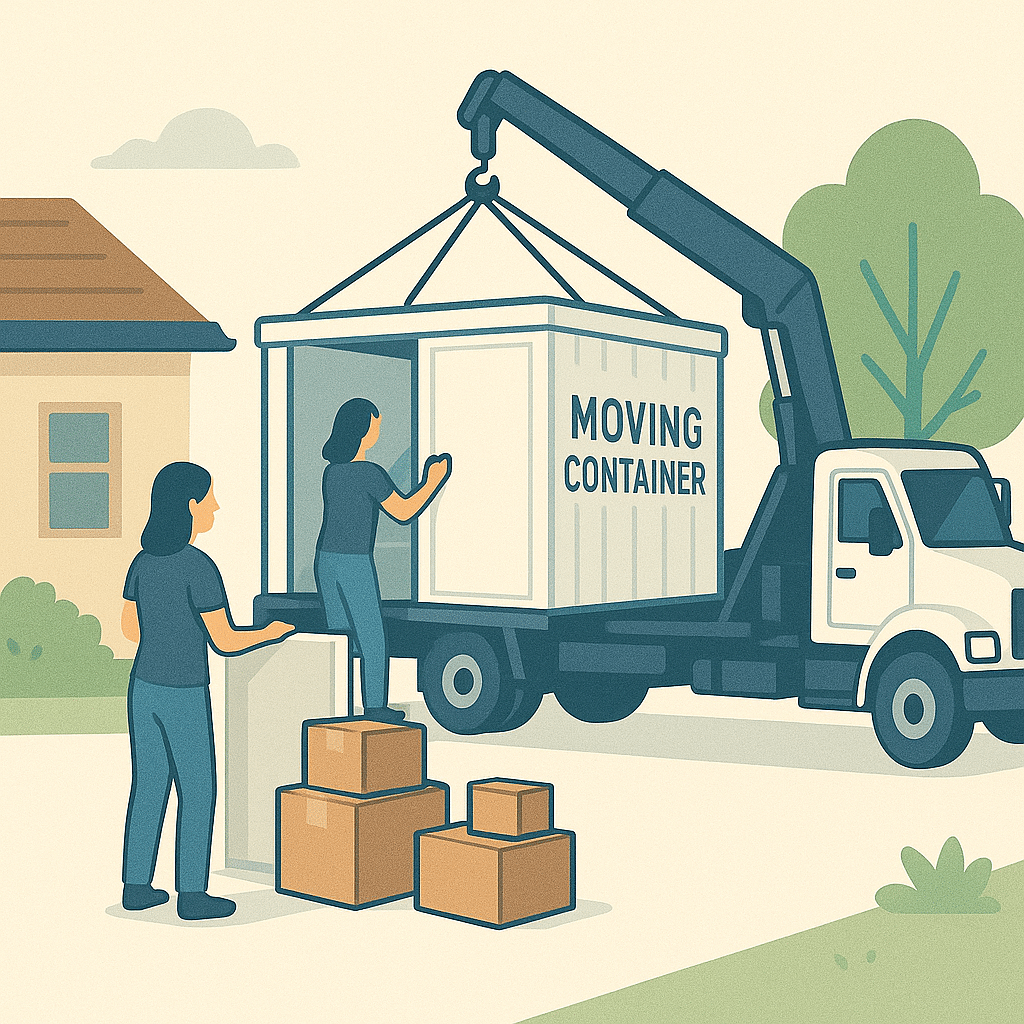
Moving containers are a great middle ground between hiring the pros and a complete DIY job. They’re like a storage unit that can be transported to your destination.
And since you don’t need to do any of the long-haul trucking yourself, that’s way less stress for you to deal with. Just make sure your HOA will allow you to park on on the street – and make sure you get it unpacked quickly so you don’t get billed for storage.
Pros
- Pack at your own pace
- No need to worry about transportation
- Different container sizes for homes and apartments of all sizes
- Cheaper than full service moving
- Allows for more control of packing/loading
Cons
- Not permitted in all locations
- Still need to DIY your packing
- Price stacks up if you take too long
Option 4: Moving Labor
You can hire moving labor, and it’ll only set you back like $40-$80 per hour. They’re more reliable than just bribing your family and friends with pizza and beer, too.
If you’re taking your appliances and other heavy items with you, you’re not gonna be able to LITERALLY DIY your move. You’ll need help with the big stuff, whether it’s your friend with a truck, or some family members with a big van. Unfortunately, friends and family have a nasty habit of just not being available the one day you need moving help.
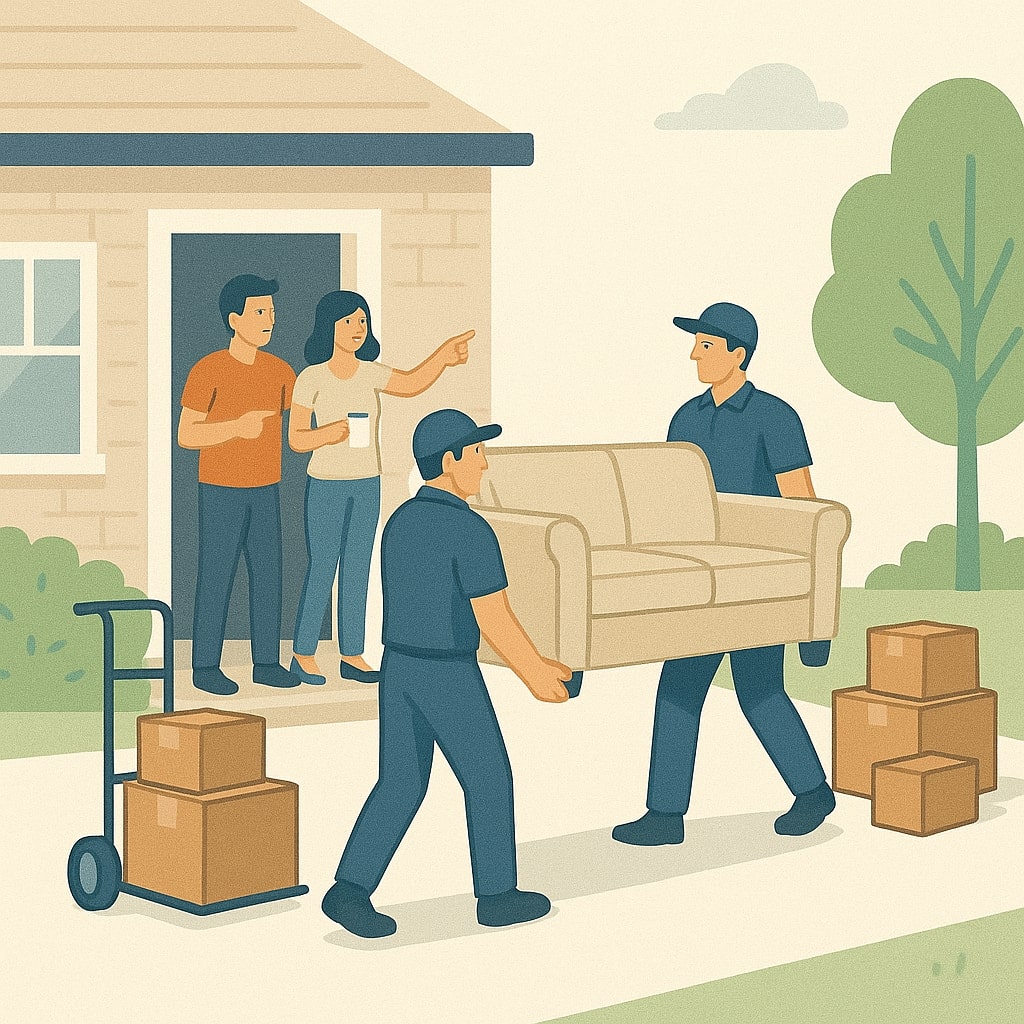
It’s much more reliable to book moving labor instead. You can still DIY the long-haul transport, and even packing and loading all your smaller items.
But when it comes to the big stuff, you can pay the pros, and they’ll take care of the heavy lifting. Once the big items are in the truck, they’ll get out of your hair and let you handle the rest.
Pros
- Not much pricier than complete DIY
- Still get to handle your own move
- Experts at lifting and loading
- More reliable than friends and family
- Quick and efficient
Cons
- Still have to handle your own move
- Still need to make sure you’re avoiding scammers
Other Moving Services You May Need
Some movers offer cookie-cutter moving plans, but you always end up paying for a bunch of services you never end up using. The best moving companies let you pick and choose your options and add-ons for a completely-custom relocation. Take a look at some of these extras:
1. Car Transport
Sure, you can load up your car and drive it to your new place. But can it really fit all of your furniture? And do you have more than one car?
Car transport comes in a variety of options, including professional driving services, open trailers, and covered trailers. Trailers keep your car from logging excess miles, and a covered trailer will keep it protected from the elements. They’re all better options than just making the same road trip over and over again.
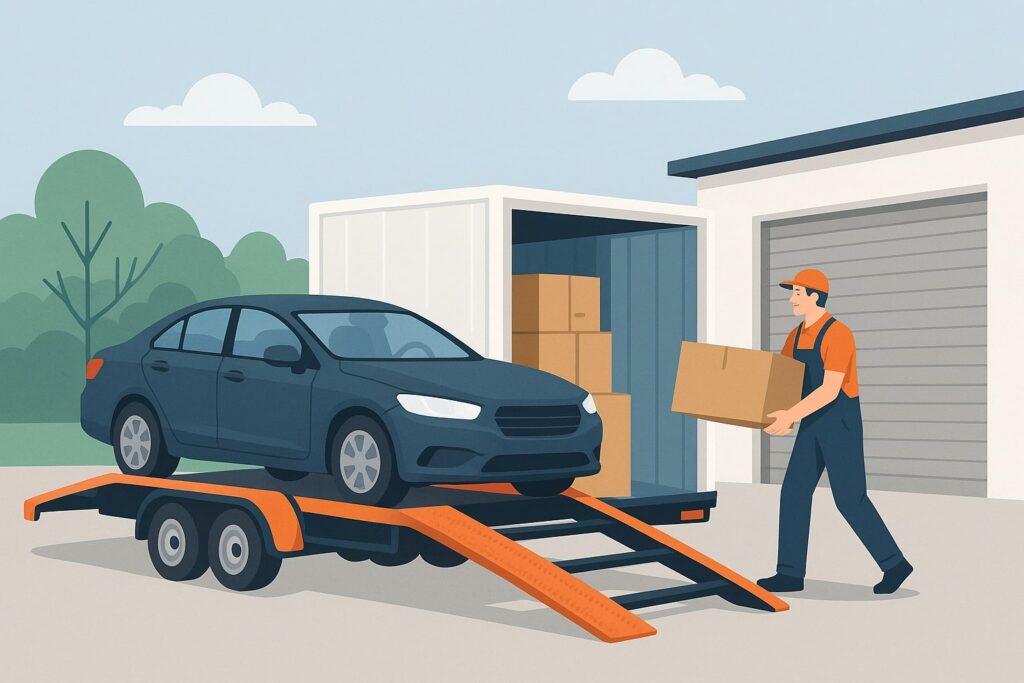
2. Storage Services
Storage is a no-brainer if you have too much stuff, but if you want some extra time to unpack, it can be a real lifesaver also.
Sure, it usually comes at a monthly rate, but if you do it right and unload your storage unit at a kinda quick pace, you won’t have to pay for more than a month or so – and some storage providers offer a free month to sweeten the deal.
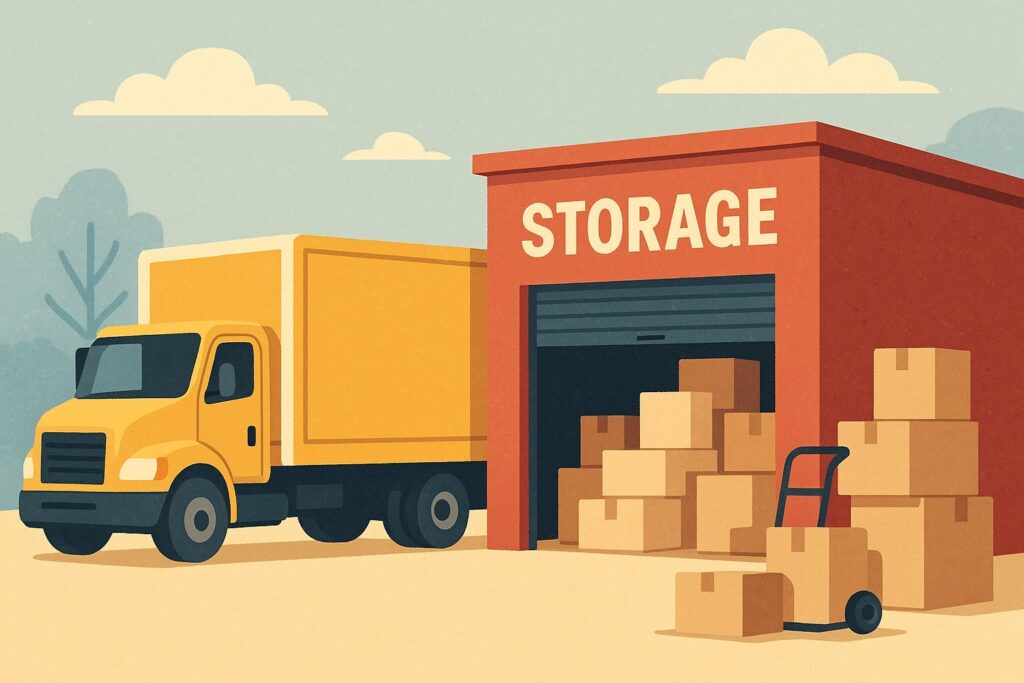
Full service storage is primarily offered by moving companies. They’ll keep all your excess belongings in a secure warehouse, and when the time comes, they’ll deliver it straight to your door. No need to rent a truck, no need to drive to a self-storage facility, and no need to deal with any extra hassle.
3. Premium Moving
Some folks have art, pianos, pool tables, and all kinds of other expensive, hard-to-handle items. This is where premium moving services can make a big difference.
Instead of risking it with a few old t-shirts and your less-than-equipped toolbox, you can book premium movers, and they’ll take care of the rest.

Premium movers will show up with all the tools they’ll need for those bulky, fragile, and awkward items. They can also get these items out of your home or apartment with minimal hiccups.
These guys are well-trained in the fine arts of disassembly and reassembly, and that includes removing doors from doorframes for that extra inch of clearance. Some of them can even hoist items out of windows.
4. Packing Services
Speaking of packing, why bother with packing when you can pay the pros to take care of it? While the bravest of the brave DIYers may be dead-set on doing their own wrapping, taping, and boxing, this is still the most time-consuming (and frustrating) part of the whole move.
Sure, it’s tough to individually wrap and pack everything you own, but there’s also all those trips to the Home Depot to buy more boxes – and they rarely have the right boxes in stock.

Not to mention how time-consuming packing can be. You’ll be wrapping and packing for weeks, and we all know you have more important (and fun) stuff to take care of.
5. Last Minute Moving
We always recommend booking your move 2 to 3 months in advance, but life isn’t always so flexible.
If you’ve got psycho roommates, a surprise job offer, or just a strong desire to go off and live somewhere else, you’ve gotta get moving fast – and last minute moving is your ticket outta here.

It takes time to find the right moving company, but if time isn’t a luxury you have, you can search for movers with a service like Moving APT. At Moving APT, we’re happy to put you in touch with last minute movers you can trust. We’ll also manage your relocation to make sure everything goes smoothly, no matter how late-notice.
Factors to Keep in Mind When Hiring a Moving Company
You’re ready to move with the pros. Here’s what you should look for when you’re shopping for moving companies:
1. Area of Operations
Will they even cover the right route?
Before you get excited about the big name movers, you have to remember some of them may not even operate in your area. Are you looking for local movers? Maybe you need a long distance moving company instead. Whatever the case, make sure they’ll cover your route.
Many moving companies provide their area of operations on their website, but it’s not always easy to find. Sometimes you’ve gotta scroll all the way down to the bottom of the page, and in the footer there’ll be a list of cities and towns they specialize in.
2. Services
What services do you want from your movers? Moving companies aren’t all created equal. Some offer packing, specialty item handling, storage, the works. Others only offer loading, hauling, and unloading – but for a lower price. Every moving company has their own menu of services. Think about what you’ll need, and work from there.
PS: Some moving companies offer these one-size-fits-all moving plans. Sounds like a good catch, but then you realize you’re paying extra for more services you may not even need. It’s cheaper to pick and choose the exact services you want, instead.
3. Pricing
You’re on a budget. Everyone is. And while you may have a bit of extra cash to throw around for professional movers, you still want to save as much as possible. Local moving can cost a a few hundred bucks, but cross-country moving can cost as much as $12,000 if you’re moving a 5-bedroom home.
When you shop for movers, get multiple quotes from multiple moving companies. This gives you a better idea of how much you’ll owe, and it also gives you a running average of what other moving companies will charge. Plus, if anything seems suspiciously low, you can write those lowball movers off as scammers. If something looks too good to be true, it probably is.
4. Reviews and Feedback
Yelp, Google Reviews, whatever you want to use. In this day and age, everyone checks the ratings – but in the moving industry, you’ve gotta be extra careful. We hate to say it, but there are a lot of scammers out there, and they don’t have any misgivings about using bots to inflate their reviews or leave fake feedback. If you see a moving company with like… 10,000 five-star reviews but barely any actual comments, that’s cause for concern.
Moving is a tough game, and reviews can be pretty unforgiving. It’s always worth a deeper look into a company’s website to see if they have any authentic customer feedback they’ve posted, whether it’s reviews, comments, or even video testimonials.
5. Certifications
Movers need to have the right licenses and certifications. First off, there’s a license issued by the Department of Transportation (DOT). If you want a legit moving company, look for their DOT number on their website – and don’t be afraid to ask for it if you can’t find it.
Aside from the DOT number, interstate moving companies need to be registered with the Federal Motor Carrier Safety Administration (FMCSA). If a moving company operates across state lines, they should have a motor carrier number provided by the FMCSA. This is typically listed as an “MC” number on company websites.
6. Company History/Experience
It’s a good sign if a company’s been around for a few years. We said it before, but moving is unforgiving, and crappy companies don’t last long. Five or more years of experience? Good to go. One to three? Maybe, but only if you’re sure you’ve seen their brand before. Experience makes a big difference, and you can do some research to make sure your movers are legit.
The Federal Motor Carrier Administration (FMCSA) has a nifty tool you can use to look up individual moving companies. Their mover database shows you tons of info about registered movers, including contact info, complaints, and even safety records. If you’re considering booking a mover, look them up to get all the details.
7. Customer Service
It’s also important to think about how their customer service reps treated you. Odds are, you had to call in to get a quote. Did you get bounced around between departments? Did you have to deal with a robo-menu? This is your first face-to-face(ish) impression with a mover, and if they’re a solid company, they’ll make sure this goes smoothly.
Think of this initial phone call as a sample. It goes well, it means you’re in good hands. But if the customer service rep is pushy, or trying to upsell you on a bunch of stuff, think hard about whether you want to deal with that in the future – especially if you’re halfway through a move and just trying to find your stuff.
Get Moving with Moving APT
If you’re ready to move, we’re ready to get you there. Moving APT can help you book movers, manage your relocation, and compare prices between the best movers in the business. Check out our moving cost calculator, and let’s get you on the road.
Prefer not to leave your phone number?
No problem!
Schedule an Appointment at your Convenience
(Only email is required)
Schedule an AppointmentOr Call Now
800-360-0037Wait!
You're only a few steps away from finding the perfect movers for your needs
Prefer to Schedule an Appointment
No problem! Schedule an appointment at your convenience by clicking the link below. We'll be ready to assist you whenever works best for you. Thank you!"
Setup an appointmentMoving FAQs
How much does moving cost?
Long distance moving can cost between $400 and $12,000. It all comes down to how much you’re hauling, and how far you’re going. A studio bedroom going 100 miles will cost closer to $400 to $1,000, but a 5-bedroom home moving cross-country will cost closer to $12,000.
On the other hand, local moves (anything under 100 miles and within the same state) are billed per hour, per mover. It usually takes two movers per bedroom, at between $40 and $80 each.
How can I save money on a move?
Downsize as much as possible before you request a quote. The less you have to move, the less you have to pay. We also recommend booking 2 to 3 months in advance. If possible, avoid moving during the summer, avoid long weekends, and avoid the beginning and end of each month.
How long does it take to move?
Best case: a day, maybe two days tops. Worst case: Up to 21 days. Movers aren’t allowed to clock more than 11 hour shifts per day, so you’re pretty limited by rules and regulations.
Most moving companies also bundle multiple moves together in the same truck for maximum efficiency. This saves money, but it means there’ll be stops for pickups and dropoffs along the way.
How can I avoid moving scams?
Always check a mover’s website for their Federal Motor Carrier Safety Administration (FMCSA) number (usually listed somewhere as an “MC” number). They should also show their Department of Transportation (DOT) number on their website.
Aside from licenses and certification, be on the lookout for prices that are too good to be true. We recommend collecting at least three quotes from three different movers. Anything that looks suspiciously low is a red flag. And any company that wants you to pay completely up front is a red flag, too.
When should I book my movers?
Try to book your movers 2 to 3 months in advance. This gives you plenty of time to prepare (or just procrastinate), and it can score you a pretty sweet discount, too. Just try to avoid peak moving season – June, July, and August are the priciest months to move.




